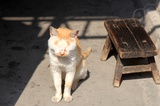新概念英语第二册Lesson78Thelastone
视频加载中...For how long did the writer give up smoking
作家戒烟戒多久了?
After reading an article entitled 'Cigarette Smoking and Your Health' I lit a cigarette to calm my nerves.
读完一篇题为《吸烟与健康》的文章之后,我点上了一支香烟,来镇定一下自己紧张的神经。
I smoked with concentration and pleasure as I was sure that this would be my last cigarette.
我聚精会神而又愉快地吸着这枝烟。因为我确信这是我最后一枝烟了。
For a whole week I did not smoke at all and during this time, my wife suffered terribly.
整整一个星期我根本没有吸烟。在此期间,我妻子吃尽了苦头。
I had all the usual symptoms of someone giving up smoking: a bad temper and an enormous appetite.
我具备了戒烟者通常表现出来的所有症状:脾气暴躁和食欲旺盛。
My friends kept on offering me cigarettes and cigars.
我的朋友们不断地向我递香烟和雪茄。
They made no effort to hide their amusement whenever I produced a packet of sweets from my pocket.
每当我从口袋里掏出一包糖果时,他们都毫不掩饰地表现出他们对此感到非常好笑。
After seven days of this I went to a party.
这样过了7天以后,我去参加一次聚会。
Everybody around me was smoking and I felt extremely uncomfortable.
我周围的每个人都在吸烟,我感到非常不自在。
When my old friend Brian urged me to accept a cigarette, it was more than I could bear.
当我的老朋友布赖恩极力劝我接受一枝香烟时,我再也忍不住了。
I took one guiltily, lit it and smoked with satisfaction.
我内疚地接过一枝点上,心满意足地抽起来。
My wife was delighted that things had returned to normal once more.
一切又都恢复了正常,为此我妻子十分高兴。
Anyway, as Brian pointed out, it is the easiest thing in the world to give up smoking.
不管怎么说,正如布赖恩指出的那样,戒烟是世界上最容易的事情,
He himself has done it lots of times!
他自己就已戒了很多次了!
New Words and Expressions 生词和短语
entitle verb [ T ] UK
/ɪnˈtaɪ.təl/
to give someone the right to do or have something给予权利; 使符合资格
Being unemployed entitles you to free medical treatment.失业时,你有权享受免费医疗。
[ + to infinitive ] The employer is entitled to ask for references.雇主有权索要推荐信。
to give a title to a book, film, etc.给…命名,给…题名
Her latest novel, entitled "The Forgotten Sex", is out this week. 她的名为《被遗忘的性别》的最新小说将于本周出版。
calm verb [ T ] UK
/kɑːm/
to stop someone feeling upset, angry, or excited
使平静; 使安静; 使镇静
He tried to calm the screaming baby by rocking it back and forth. 他来回摇晃着嚎哭的婴儿,想让他安静下来。
nerve noun UK
/nɜːv/
a group of long, thin fibres (= structures like threads) that carry information or instructions between the brain and other parts of the body 神经
the optic nerve 视神经
the courage or confidence necessary to do something difficult, unpleasant, or rude勇气; 胆量; 魄力
It takes a lot of nerve to be a bomb disposal expert. 当拆弹专家需要极大的勇气。
I wanted to ask her out, but I lost my nerve and couldn't go through with it. 我曾想约她出来,但我失去了勇气,说不出口。
concentration noun UK
/ˌkɒn.sənˈtreɪ.ʃən/
the ability to think carefully about something you are doing and nothing else
专注,专心
The noise outside made concentration difficult. 外面吵得我难以集中注意力。
There was a look of intense concentration on her face. 她脸上带着全神贯注的表情。
I find that yoga improves my powers of concentration. 我发现练瑜伽提高了我的注意力。
It was hard to follow what the teacher was saying, and eventually I lost concentration. 我发现自己难以理解老师在讲什么,最后就走神了。
suffer verb UK
/ˈsʌf.ər/
to experience physical or mental pain
受苦; 受折磨
I think he suffered a lot when his wife left him. 我想他妻子离开他时,他一定很痛苦。
She suffers in the winter when it's cold and her joints get stiff. 冬天天气寒冷,她的关节会变得僵硬,这让她非常难受。
symptom noun [ C ] UK
/ˈsɪmp.təm/
any feeling of illness or physical or mental change that is caused by a particular disease
(疾病的)症状
He's complaining of all the usual flu symptoms - a high temperature, headache, and so on.他说他出现了所有常见的感冒症状 —— 高烧、头痛等。
He's been HIV-positive for six years, but just recently he's started to develop the symptoms of AIDS. 他 HIV 病毒检测呈阳性已有6年时间,但直到最近才开始出现艾滋病的症状。
temper noun UK
/ˈtem.pər/
the tendency to become angry very quickly
脾气;易怒
She has a real temper. 她很容易发脾气。
He's got a really bad temper. 他的脾气真坏。
appetite noun UK
/ˈæp.ə.taɪt/
the feeling that you want to eat food
食欲,胃口
All that walking has given me an appetite. 走了那么远的路,我胃口大开。
I won't have any chocolate, thanks. It will spoil (= reduce) my appetite. 多谢,我不吃巧克力,吃了会影响食欲。
I haven't got much of an appetite (= I am not hungry). 我没什么胃口。
The children all have healthy/good appetites (= they eat a lot). 孩子们胃口都很好。
produce verb [ T ] UK
/prəˈdʒuːs/
to make something or bring something into existence
生产; 出产; 制造
France produces a great deal of wine for export. 法国生产大量葡萄酒供出口。
Red blood cells are produced in the bone marrow. 红细胞在骨髓内生成。
She works for a company that produces (= makes for sale) electrical goods. 她在一家生产电子产品的公司工作。
I was wondering whether I could produce a meal out of what's left in the fridge. 我不知道能否用冰箱里剩的东西做一顿饭。
urge verb [ I or T ] UK
/ɜːdʒ/
to strongly advise or try to persuade someone to do a particular thing
敦促; 驱策; 力劝
[ + to infinitive ] Lawyers will urge the parents to take further legal action. 律师们会力劝家长们采取进一步的法律行动。
[ + that ] Investigators urged that safety procedures at the site should be improved. 调查人员敦促该工地改进安全规程。
Police urged continued vigilance in the fight against crime. 警方呼吁继续保持警惕打击犯罪。
satisfaction noun UK
/ˌsæt.ɪsˈfæk.ʃən/
a pleasant feeling that you get when you receive something you wanted, or when you have done something you wanted to do
满足,满意
She looked at the finished painting with satisfaction. 她满意地看着完成的画作。
She derived/obtained great satisfaction from/out of helping other people. 她帮助别人,由此获得了巨大的满足。
For me, job satisfaction is more important than the money. 对我来说,从工作中得到的满足比钱更重要。
She had the satisfaction of knowing that she'd done everything she could. 知道自己已经尽力了,她就没什么遗憾了。
delighted adjective UK
/dɪˈlaɪ.tɪd/
very pleased
高兴的,快乐的
a delighted audience 兴高采烈的观众
Pat was delighted with her new house. 帕特对她的新居非常满意。
I was delighted at/by your news. 你带来的消息让我很高兴。
[ + that ] I'm absolutely delighted that you can come. 你能来,我特别高兴。
[ + to infinitive ] We'd be delighted to come to dinner on Friday. 我们很高兴来参加星期五的晚宴。
作者最新文章
- 1 CNN知天下-如何在家中科学健身减肥
- 2 时代周刊颁奖青年气候活动家ClaireVlases年度人物ClimateKids
- 3 史蒂夫·哈维-想成功必须这样做SUCCESSFULPERSON
- 4 Lucy老师-如何用英语搭话从初级到高级
- 5 Max老师-40个关于自然与园林的词汇NatureandGardenWords
- 6 学英语知天下-2024年12月12日VOA
- 7 Anne老师-如何使用连词让你的英语表达更清晰流畅
- 8 轻松英语-英国人如何看待新闻HowdotheEnglishwatchnews
- 9 Hardar老师-如何练就完美英语发音Pronunciationtips
- 10 CNN知天下-世界上最古老的冰
教育TOP
- 1 北大教授李玲震撼发问:如果不能给人民免费医疗和教育,我们的革命是为了什么
- 2 小学生“倒数第一”试卷走红,老师:这孩子智商太高,我教不了
- 3 17岁在校高中生被老师活活打死,死前跪地求饶,我错了我不敢了
- 4 教育部发布通知:初中升高中将迎来大变动,家长:幸福来到太突然
- 5 张雪峰:未来社会上最顶尖的只有这4大专业,千万不能错过
- 6 全国4所本科高校停办,将停止招生,学生和家长要看清楚!
- 7 真没想到!这四类人不属于公务员,甚至连编制都没有
- 8 《小巷人家》被拒之门外的鹏飞,高考落榜后经商,用一生报答黄玲
- 9 事业编制的专业技术岗和工勤岗的差距究竟能有多大。
- 10 我为女总监的女儿辅导作文;那天辅导结束后,她不让我走了
教育最新文章
热门分类
